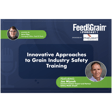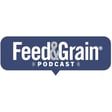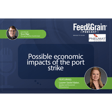
Effective HR management for small companies
In this episode of the Feed & Grain Podcast, Kristen Ireland and Erin Mies, co-founders of People Spark Consulting stop by to talk with host Steven Kilger about effectively handling human resources as a small company. They discuss how companies can create a effective company culture, the tips for developing talent inhouse, why managers are key to effective HR policies and resources for having a effective HR strategy without a large staff.
Podcast sponsored by Pneumat Systems.
Materials mentioned in podcast:
Click HERE to receive additional resources on the topics covered in the Podcast:
- How to define your business strategy and goals and align your HR practices.
- How to engage and develop high performing employees, and
- How to talk to long term employees during succession planning.
Purchase The People Spark®: A Business Leader’s Essential Guide to Crafting Your Culture with Confidence from Amazon.
Sign up for the People Spark mailing list to receive free resources, tips, and tools each month.
Schedule a 30-minute call with a member of the People Spark team to answer your questions.















